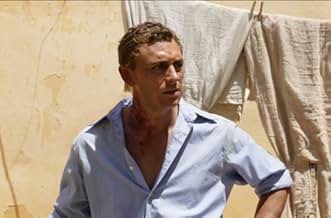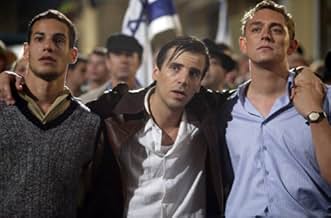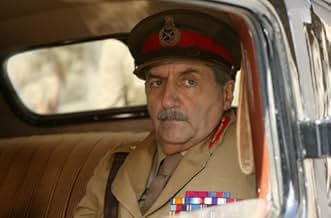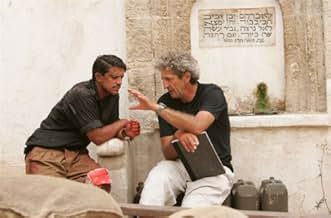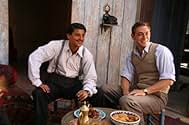NOTE IMDb
6,0/10
1 k
MA NOTE
Ajouter une intrigue dans votre langueA tale of friendship between two men, one Jewish and the other Arab, as the country of Israel is being created.A tale of friendship between two men, one Jewish and the other Arab, as the country of Israel is being created.A tale of friendship between two men, one Jewish and the other Arab, as the country of Israel is being created.
- Réalisation
- Scénario
- Casting principal
Mhairi Morrison
- Cathy
- (as Mhairi Steenbock)
Avis à la une
My major gripe is not the slant, the film was not a propaganda screed for either side, but it is so inaccurate as to be nearly worthless. First, any one who spent any time in Israel will note immediately that it was not filmed there, the scenes do not remotely resemble the real sites where the events of 1948 took place. Major facts are fumbled--e.g., the Jewish Quarter of the Old City fell long before the first cease-fire (from the movie, it is hard to tell exactly what happened). In another scene, right before the Partition vote travelers are shown on a modern-style glass bus from Tel Aviv to Jerusalem--going over a non-existent river--with Arabs and Jews on the same bus!
The acting is TV-grade melodrama and the script is trite.
As for the overview-historical content, the movie falls to illuminate the events the lead up to the conflict--and with the single exception of the depiction of Deir Yassin, makes it seem as though the war was fought between a handful of well-meaning nice guys. But the 1948 war was bloody and ugly, with many atrocities committed on both sides, but especially the Arab side that was trying to wipe out the Jewish community of Palestine (later Israel).
Finally, as already pointed out, this movie does horrible violence to LaPierre and Collins' fine book, one of the few truly even-handed non-fiction books written about the Arab-Israel conflict (In the trailer, even this was mangled as the book is called a "novel").
If any one wants to see a much better movie covering almost the exact same topic get "Cast a Giant Shadow."
The acting is TV-grade melodrama and the script is trite.
As for the overview-historical content, the movie falls to illuminate the events the lead up to the conflict--and with the single exception of the depiction of Deir Yassin, makes it seem as though the war was fought between a handful of well-meaning nice guys. But the 1948 war was bloody and ugly, with many atrocities committed on both sides, but especially the Arab side that was trying to wipe out the Jewish community of Palestine (later Israel).
Finally, as already pointed out, this movie does horrible violence to LaPierre and Collins' fine book, one of the few truly even-handed non-fiction books written about the Arab-Israel conflict (In the trailer, even this was mangled as the book is called a "novel").
If any one wants to see a much better movie covering almost the exact same topic get "Cast a Giant Shadow."
I enjoyed this film and I'm going to review it instead of discussing the pros and cons of Israel/Palestine.
I saw it at Cinema Sundays at the Charles, here in Baltimore MD USA.
In the interest of full disclosure, I am not Jewish, and I am anti-Israel and pro-Palestine.
At Cinema Sundays, the host is Jewish, and this week's discussion leader is also Jewish -- I think I'm safe in saying it's a largely Jewish group which goes to Cinema Sundays and attended this screening. Although a show of hands said that more liked it than disliked it, the host and discussion leader didn't like it at all --- the discussion leader had even skipped the pre-screening the day before -- his reason seemed to boil down to he had better things to do.
The discussion was largely (but not all) panning the film.
I thought (with one glaring exception, which I won't reveal here) that the movie was balanced, while telling the story primarily from the Jewish side. In the foreground, it concerns an American Jew and an Arab Palestinian who meet in the U.S. and become friends. Each finds himself going to Palestine in 1947, knowing that a conflict is coming, a struggle for control of the land. The story of these two men and their friends and lovers is in the foreground, and in the background is the story of the British leaving Palestine, and the U.N. vote for partition.
There's a fair amount of violence, sudden, unexpected violence realistically portrayed. However, there's no enjoyment of the mayhem, and but little glorification of it.
I felt well-informed by the movie in terms of its telling of the story of the birth of Israel. I think this is good story-telling -- although, of course, the two main characters keep encountering each other even after they split up - well, duh, it's a movie about these two characters! :o) A little cinematic license. There's a very touching and emotional scene near the end which had me riveted.
I think the story is told relatively objectively (which is to say, more objectively than, say, 90% of news coverage here in the USA, which overwhelmingly favors Israel) while holding out hope for reconciliation between Arabs and Jews in Israel/Palestine. And, I have to say, I think that's why so many people at Cinema Sundays disliked the movie, without really being able to articulate why ("I've seen this all before, oversimplified, unlikely...") -- because it was objective and told the Arab side, and portrayed the Palestinians as human beings who suffered in the partition.
I give it an 8 because of the one pulled punch, which I thought destroyed the balance of the film. I'll discuss that on the Message Boards, as I don't want to Spoil the movie.
I saw it at Cinema Sundays at the Charles, here in Baltimore MD USA.
In the interest of full disclosure, I am not Jewish, and I am anti-Israel and pro-Palestine.
At Cinema Sundays, the host is Jewish, and this week's discussion leader is also Jewish -- I think I'm safe in saying it's a largely Jewish group which goes to Cinema Sundays and attended this screening. Although a show of hands said that more liked it than disliked it, the host and discussion leader didn't like it at all --- the discussion leader had even skipped the pre-screening the day before -- his reason seemed to boil down to he had better things to do.
The discussion was largely (but not all) panning the film.
I thought (with one glaring exception, which I won't reveal here) that the movie was balanced, while telling the story primarily from the Jewish side. In the foreground, it concerns an American Jew and an Arab Palestinian who meet in the U.S. and become friends. Each finds himself going to Palestine in 1947, knowing that a conflict is coming, a struggle for control of the land. The story of these two men and their friends and lovers is in the foreground, and in the background is the story of the British leaving Palestine, and the U.N. vote for partition.
There's a fair amount of violence, sudden, unexpected violence realistically portrayed. However, there's no enjoyment of the mayhem, and but little glorification of it.
I felt well-informed by the movie in terms of its telling of the story of the birth of Israel. I think this is good story-telling -- although, of course, the two main characters keep encountering each other even after they split up - well, duh, it's a movie about these two characters! :o) A little cinematic license. There's a very touching and emotional scene near the end which had me riveted.
I think the story is told relatively objectively (which is to say, more objectively than, say, 90% of news coverage here in the USA, which overwhelmingly favors Israel) while holding out hope for reconciliation between Arabs and Jews in Israel/Palestine. And, I have to say, I think that's why so many people at Cinema Sundays disliked the movie, without really being able to articulate why ("I've seen this all before, oversimplified, unlikely...") -- because it was objective and told the Arab side, and portrayed the Palestinians as human beings who suffered in the partition.
I give it an 8 because of the one pulled punch, which I thought destroyed the balance of the film. I'll discuss that on the Message Boards, as I don't want to Spoil the movie.
O Jerusalem is a terrible movie. Very bad, stilted acting and a very, very bad script. I had looked forward to watching this movie because I read the book and have emotional views regarding Israel's war of independence (or as the Arabs call it, "The catastrophe").
This movie had virtually no resemblance to that book, which was an excellent portrayal of the siege of Jerusalem and was not otherwise burdened down by a phony relationship between a Palestinian and an American Jewish fighter. The pace of the movie did not allow for any meaningful storyline development. Some of the acting was so bad it was laughable, which is sad, because there is no comedy in this story. The lines written only served to exacerbate the bad acting. The shame of it is that while probably low budget, the movie had suffcient props and scenery to have allowed for a better production.
My sad recommendation is to strongly urge you to stay away!
This movie had virtually no resemblance to that book, which was an excellent portrayal of the siege of Jerusalem and was not otherwise burdened down by a phony relationship between a Palestinian and an American Jewish fighter. The pace of the movie did not allow for any meaningful storyline development. Some of the acting was so bad it was laughable, which is sad, because there is no comedy in this story. The lines written only served to exacerbate the bad acting. The shame of it is that while probably low budget, the movie had suffcient props and scenery to have allowed for a better production.
My sad recommendation is to strongly urge you to stay away!
That, oh so poignant verse from Psalm 137 altogether sums my impressions of the film. By all means, I am kind with my assessment. This should have been a great film, provided, the Hollywood script writers followed the book's theme. Alas, they did not; what else is new under the sun!
Despite its potential, the film did not explore or enunciate enough two of its main themes: the futility of war and more important, man's continued penchant to inflict inhumanity on fellow man. Oh yes, Bobby Golden Boy Goldman, one of the film's major players does indeed state either or both of those strong tenets even boldly. However, he does so en passant. Moreover, his excellent points are nonetheless made moot as the director cuts to the chase and the next bloodied then quickly sanitized atrocious conflict scene time and again. And there were so many of these telegraphed, goofy scenes. So many in fact,that soon I lost count.
Not long after, quite frankly I lost any or all lingering interest to stick it out until the curtain fell. Thank God for that tender mercy. This low budget, grade 'B' production could not end soon enough.
Before I exit, I must say that the film's depiction of the British protector-ship of the former Palestine was well, pathetic. Yes, we got it; the Thin Red Line had already gone bald and lost all of its former glory by that point. However, to paint them redder, er, yellow and to make them appear more inept even treacherous to the Hebrew cause, is well taking many creative, film making liberties.
Sure, the Brits neglected their peace keeping role while there. Even General Barker voiced his 'haaarrumph' stilted opinion and attested to that very fact while protesting to the then backpedaling, fleeing British High Commissioner. Still, he did so in a not so poignant manner nor propitious moment. No matter. The film had already gone so far south that it was difficult for me to discern which way lay O Jerusalem let alone the true path to peace.
I believe, the director and producer, though in an odd way tried to make their best case (whatever that was, we will never know). To wit, they could have done better with the film's plot if they had invested more time in exploring that noble road map to peace theme. No doubt, that lofty goal was well within their grasp and cinematic scope. However, all too predictably they instead chose to either neglect it, cut it first pass, or simply cast it aside altogether, just the same.
Like the British, Hollywood just could not help themselves nor the script. At every turn the actors fumbled the football, or bungled the entire dialog until finally, together, the flimsy cast and entire film crew botched what should have been an otherwise beautiful, possibly even most edifying film.
Forget about it!
Sigh...
Despite its potential, the film did not explore or enunciate enough two of its main themes: the futility of war and more important, man's continued penchant to inflict inhumanity on fellow man. Oh yes, Bobby Golden Boy Goldman, one of the film's major players does indeed state either or both of those strong tenets even boldly. However, he does so en passant. Moreover, his excellent points are nonetheless made moot as the director cuts to the chase and the next bloodied then quickly sanitized atrocious conflict scene time and again. And there were so many of these telegraphed, goofy scenes. So many in fact,that soon I lost count.
Not long after, quite frankly I lost any or all lingering interest to stick it out until the curtain fell. Thank God for that tender mercy. This low budget, grade 'B' production could not end soon enough.
Before I exit, I must say that the film's depiction of the British protector-ship of the former Palestine was well, pathetic. Yes, we got it; the Thin Red Line had already gone bald and lost all of its former glory by that point. However, to paint them redder, er, yellow and to make them appear more inept even treacherous to the Hebrew cause, is well taking many creative, film making liberties.
Sure, the Brits neglected their peace keeping role while there. Even General Barker voiced his 'haaarrumph' stilted opinion and attested to that very fact while protesting to the then backpedaling, fleeing British High Commissioner. Still, he did so in a not so poignant manner nor propitious moment. No matter. The film had already gone so far south that it was difficult for me to discern which way lay O Jerusalem let alone the true path to peace.
I believe, the director and producer, though in an odd way tried to make their best case (whatever that was, we will never know). To wit, they could have done better with the film's plot if they had invested more time in exploring that noble road map to peace theme. No doubt, that lofty goal was well within their grasp and cinematic scope. However, all too predictably they instead chose to either neglect it, cut it first pass, or simply cast it aside altogether, just the same.
Like the British, Hollywood just could not help themselves nor the script. At every turn the actors fumbled the football, or bungled the entire dialog until finally, together, the flimsy cast and entire film crew botched what should have been an otherwise beautiful, possibly even most edifying film.
Forget about it!
Sigh...
Although the film describes historical events in a relatively balanced way, eventually tends to tip the balance on the Israeli side, like most movies that reach the western circuit. I guess that the producers coming from that side or afraid of failing in the US market, highly influenced by the Jewish lobby, is behind that.. Why French actors were involved in this project? At the end a story of friendship in a world in conflict but a more dispassionate and objective look is needed. That a successful best seller was the main source does not ensure that the script will match (this is the case). In light of current events, the somewhat romantic look in other movies (Exodus for example) is given on the emergence of the state of Israel, is at least anomalous. Some of it is on this film.
Le saviez-vous
- GaffesIn the United Nations General Assembly vote on partition, a vote is heard from Myanmar. This name was used only since 1989 by the military government; Burma is still the name recognized by the U.S. and most of the world.
- Citations
Golda Meir: Your Majesty, we could never accept it. You know this. Of course we want peace, But we also want a land of our own.
- ConnexionsReferenced in Le voyage du ballon rouge (2007)
Meilleurs choix
Connectez-vous pour évaluer et suivre la liste de favoris afin de recevoir des recommandations personnalisées
- How long is O Jerusalem?Alimenté par Alexa
Détails
- Date de sortie
- Pays d’origine
- Site officiel
- Langues
- Aussi connu sous le nom de
- Beyond Friendship
- Lieux de tournage
- Sociétés de production
- Voir plus de crédits d'entreprise sur IMDbPro
Box-office
- Budget
- 24 000 000 $US (estimé)
- Montant brut aux États-Unis et au Canada
- 234 480 $US
- Week-end de sortie aux États-Unis et au Canada
- 31 165 $US
- 21 oct. 2007
- Montant brut mondial
- 2 724 303 $US
- Durée
- 1h 40min(100 min)
- Couleur
- Mixage
- Rapport de forme
- 2.35 : 1
Contribuer à cette page
Suggérer une modification ou ajouter du contenu manquant


